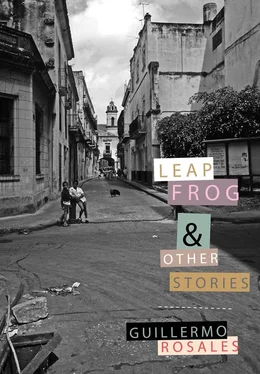So he took it, definitively, in his hands, and rubbed it like a good Boy Scout rubs a pine stick to make a fire in the dark forest.
He was just playing.
Because he never felt that ticklish sensation that Tin Marbán mentioned.
He was like that for a while, rubbing himself as he reviewed the clouds, absorbed. Discovering in them new faces, objects and characters that took shape in their slow march toward the West. He closed his eyes.
The great star Tongolele, who announced Sensat oil, found him in his boudoir.
“Hello!” she exclaimed, disconcerted. “Were you here?”
Quasimodo saw her lift her leg and undo her garter straps. She was then barefoot on the rug, and walked around the room, with her zipper down.
She turned toward Quasimodo then, and with an air of indifference, she took off her bra. Quasimodo contemplated her tits shaking freely and threw himself on them.
“What are you doing, you monster!”
He trapped her between his hands. He could feel his heart beating at the tip of his phallus. His gigantic, eighteen inch phallus.
Tongolele fell, definitively conquered, onto the grass of his boudoir. Quasimodo violently entered that soft body, listening to the crunching of membranes and the squealing of organs. Tongolele’s organs, the great star of Sensat Oil. The woman with the fabulous tits who —
Suddenly, he shuddered.
Inside his head came an unexpected somersault.
He felt that something inside him was coming loose.
Something was being unleashed after having been shut up for thousands of years. New. Unknown. Something that shook him to the marrow of his bones and caused strong shudders of pleasure.
Something had erupted from his deepest insides. And now in a grandiose stupor, he looked at his hands.
Thick, white lava.
Sticky lava like the saliva from a cold.
Like paste itself.
He understood everything at once during that decisive moment. With an unfamiliar calm, he stood up and went to the gate of the yard.
Then he said, solemnly and seriously: Ladies and Gentlemen.
As if before the Grand Jury of Public Opinion.
And he started running forever.
The sun was beating down hard on the wild rosemary, and its rays were melting over the countryside in purple and greenish lights. And from a wall, a lizard took out its red tie in the intermittent signal of “danger,” “danger,” “danger.”
HAVANA, 1968
They called her La Baudilia, because she was the exact female version of her brother, that famous Baudilio Cartablanca, who later ended a long career as a Venezuelan revolutionary, dying a renegade. She had the same sharp nose, the same bulging eyes, and the same measured and gentle way of speaking that hid, or tried to hide, a naive self-sufficiency.
I met her at the Quintelas’ home, in the Apolo neighborhood, and I quickly hit it off with her because of her open and aggressive spirit, and the fact that she was a great storyteller.
One of those stories was about her own life.
She said she had come to know love late in life because, as a girl, her brother scared off her boyfriends. She said it with a smile, although with a distant note of bitterness. The last of her suitors was a young man, Consolación, from her town, who dressed very elegantly, and always showed up with a handful of roses, smelling of French cologne. He seemed like one of the knights of old. His relationship with her did not go beyond an inoffensive clutching of hands and a whispering exchange of songs. Their courtship lasted three months, until the day on which Baudilio, her ferocious brother, came home early from a political meeting and confronted the young man with a disdainful expression.
The suitor was a refined young man. He crossed his legs in the English manner and spoke with the voice of a provincial poet. Baudilio looked him over, found out he was a symbolist poet, touched the feeble muscles of his arm, and at last said mockingly, “So this is the little fag you found for yourself.”
It was the end. The young man wanted to protest, but he couldn’t. Instead of daring to respond to the insolence with a strong word or a punch in the mouth, he left the house in shame, tears in his eyes, and never returned.
“Right there, I decided to become a nun.”
She decided it in silence, counting on her Roman Catholic and Apostolic mother’s complicity. First, she was put in a convent on Calle 23, in the heart of Havana that didn’t let in sunlight or even the sound of swallows chirping.
Her brother Baudilio went there with four drunk friends to rescue her and bring her back to the outside world. But the nuns refused to open the doors; they didn’t let him see her, and everything ended when her brother, sauced with rum, unloaded the cartridge of a machine gun on the convent’s old wall and left, cursing the priests and swearing he would return one day to remove her by force.
Perhaps that was why the convent’s superior decided to send La Baudilia to Madrid, to a convent on San Cosme and San Damián Street, where they worked hard and only spoke of essential matters. That was where La Baudilia’s crisis of conscience began. Why was she there? Why should she hand her life over to God in such an absurd way? She endured some very agonizing days due to the immensity of her doubts. She even doubted Saint Teresa, who was her inspiration on dark nights. On one of those nights, she couldn’t take it anymore and went to the convent’s altar, seeking an answer.
The altar was dark, only a small candle at the feet of a plaster Saint Teresa shed a little light.
La Baudilia fell in desperation before Christ on the cross and said:
“Lord, take pity on me. If you are real, if you exist, show yourself right now and give me the strength to follow this path.”
But God did not show himself, nor was his voice heard, nor did any light flicker strangely.
Then she turned toward the darkest part of the chapel and spoke thus:
“Satan, I am not afraid of you. If you truly exist, turn yourself into flesh and blood so I can see you and be your eternal servant.”
But the devil didn’t appear either. Nothing.
The next day, she packed her belongings, dressed in lay clothes, and went straight to the airport to return to Cuba, to her brother, and to the revolution.
That was her story.
“None of it exists,” she said to us, at last, leaning against the front door. “God, the devil, it’s all a lie.”
And she left. Rosa and I leaned out the window to see her walk off down Calle Mariel. She was wearing men’s jeans, a Caribbean cruise shirt that was too large for her, electrician boots, a hairstyle like a cocky Frenchman, and her gait was aggressive and shameless like a tough guy from the Pogolotti neighborhood.
Then, the Quintelas and I looked down at our hands in silence, looked in each other’s faces again in silence, and understood, in silence, how terrible it was. How terribly and expertly the devil worked.
The door to Alipio’s barbershop opened first thing in the morning and a man with a thug-like face entered, dressed in a blue security guard uniform with a holster full of bullets from which hung a Star handgun in its case. Alipio saw him arrive and felt a chill rise up through his legs and take root in his heart, which skipped a beat.
It was him. Alipio had not forgotten that ocher-colored face, the hairy ears, the gold tooth, the thin mustache that had been so in vogue back in the 1950s. It was him. Thirty years was not enough to change his basic characteristics. It was him. Here, in Miami, he was the security guard of some cemetery or clothing store; over there, in Cuba, before the revolution, he was Captain Ovidio Samá of the Military Intelligence Service with an evil, ferocious, and mean reputation.
Читать дальше












